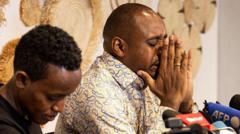Cardinal David embodies Pope Francis's vision of a Church more attuned to the needs of its poorer congregants, yet faces significant challenges amidst evolving societal attitudes toward the Catholic faith in the Philippines.
Cardinal David Faces Challenges as He Joins Conclave Following a Notable Rise

Cardinal David Faces Challenges as He Joins Conclave Following a Notable Rise
Cardinal Pablo Virgilio David, recently elevated to cardinal by Pope Francis, prepares for his role in the papal conclave while reflecting on the Church's challenges in the Philippines.
Cardinal Pablo Virgilio David is on the eve of a significant moment in his religious life as he prepares to join the conclave in Rome to help elect the next pope. The appointment, which he describes as surreal, comes just five months after he was made a cardinal by Pope Francis — a rare elevation for a bishop from a small diocese primarily serving impoverished communities. David believes his selection serves to bring greater representation of ground realities in the Church hierarchy.
Known affectionately as "Apu Ambo" to his devotion-filled congregation in Caloocan, Cardinal David has pursued a ministry deeply rooted in social justice, spending his life championing the rights of the marginalised and less fortunate. The Philippines, home to the largest Roman Catholic population in Asia, holds significant weight in the larger Church context, with individuals like Filipino Cardinal Luis Antonio Tagle also considered a candidate for pope due to the unwavering faith of Filipino Catholics.
However, the Church in the Philippines is grappling with new challenges as it seeks to remain relevant. The evolution of social values has led to a questioning of Church doctrine on topics such as divorce and family planning, amplified by the appeal of charismatic movements gaining followers.
Cardinal David has emerged as a notable voice during turbulent times, particularly during the war on drugs initiated by former President Rodrigo Duterte, which left thousands dead. The cardinal openly criticized these actions, taking a stand that put him at grave risk and warranting support from Pope Francis, who reassured him during a visit in 2019, acknowledging the difficult circumstances he faced.
The Catholic Church's long history in the Philippines, entwined with both colonialism and national governance, continues to influence its modern-day standing. Although historically revered, the Church's alliance with powerful political entities has often been criticized. The impact of liberation theology during the late 20th century has left a legacy, yet its current position seems less authoritative amidst newer socio-political challenges.
As the political climate evolves, many within the Church, including Cardinal David, feel the necessity of a reassessment of its approach to governance. The recent push for new legislation regarding divorce signifies a broader shift, as Catholic lawmakers like Geraldine Roman advocate for family law reform amidst the Church's opposition. In a society where attendance has declined and scandals have marred its moral standing, Cardinal David emphasizes the need for humility and genuine connection with the community as the Church seeks to restore its credibility and relevance in Filipinos' lives.
Through the upcoming conclave, Cardinal David's representation may signal a shift towards a Church more reflective of its diverse congregation and responsive to both spiritual and social dilemmas facing its parishioners today. His journey from a humble bishop to a significant figure in the Church underscores the complexities of faith and modernity, continuing the dialogue on the role of religion in an ever-changing society.



















